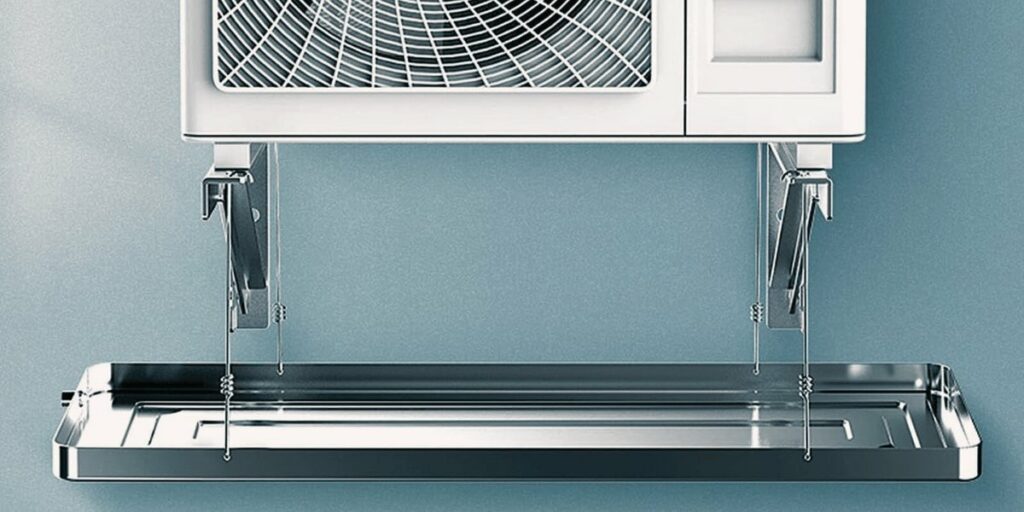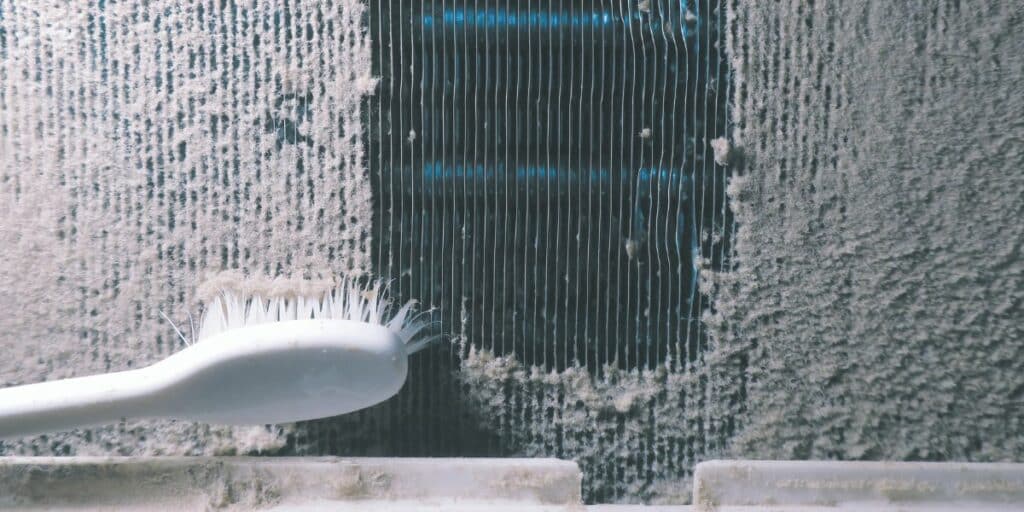When it’s hot outside, a smelly air conditioner can ruin the comfort of your home. Determining the type of smell from your AC can help fix the problem. Whether dealing with a musty mold or a burning scent, each odor indicates a different issue. This guide will help you identify why your AC smells bad and how to eliminate the odor so your home stays fresh and comfortable.
Identifying Common AC Odors: Causes and Solutions
The first step to tackling bad odors from your air conditioner is pinpointing when and where the smell is strongest. Is it immediate upon turning the AC on, or does it develop over time? Is it localized to one area or throughout your home? These observations are crucial in diagnosing the issue.
Mold or Mildew
A musty smell is often the most reported odor in household AC units, indicating the presence of mold or mildew. This usually occurs when excess moisture is within the system, providing a perfect breeding ground for mold spores. The health risks associated with breathing in mold spores, especially for those with respiratory issues, make it imperative to address this problem promptly.
The mold or mildew in your air conditioning unit can be attributed to several factors, each related to moisture control and ventilation within the system.
The Drain Pan is Full
The drain pan is a crucial component of your air conditioning system, designed to collect condensation that forms during the cooling process. If this pan becomes full or clogged, it can stagnate water, creating an ideal breeding ground for mold. This stagnant water and mold growth can cause a musty odor distributed throughout your home when the AC is turned on.

Evaporator Coil Issues
Evaporator coils play a vital role in your air conditioning unit by removing heat. However, these coils can become a hotspot for mold growth over time due to the moisture they collect. When mold accumulates on or around the evaporator coils, it can lead to a moldy smell emanating from your air conditioner.
Excess Moisture in Ducts or Vents
Mold and mildew thrive in moist environments, making the ducts and vents of your air conditioning system prime targets for mold growth if excess moisture is present. This problem is compounded when the air conditioner blows air through these mold-infested vents or ducts, spreading the musty smell throughout your home.
What do you do with an air conditioner when it smells like mold or mildew?
To combat the mold or mildew smell from your air conditioner, follow these steps:
Empty and Clean the Drain Pan
First, inspect your drain pan. If you find it full or clogged, empty it and give it a thorough cleaning with soap and water. This simple step can remove mold buildup and prevent the odor from spreading.
Clean the Air Conditioner Filters
Air conditioner filters are designed to trap dirt, dust, and debris from the air, but they can also become blocked over time. When clogged, filters restrict airflow and create conditions conducive to mold growth in the vents and ducts. Cleaning or replacing your air conditioner filters regularly can significantly reduce the risk of mold and eliminate the musty smell.
Call a Professional
If the moldy smell persists despite cleaning the drain pan and filters, or if you’re unable to identify the source of the smell, it may be time to call in a professional. HVAC technicians can thoroughly inspect your air conditioning system, identify the root cause of the mold growth, and implement effective solutions to resolve the issue.
Gas or Rotten Eggs
If you notice a smell resembling gas or rotten eggs, it’s a serious concern that could indicate a gas leak. While most home AC systems don’t use natural gas, the odor could be from a gas-powered furnace in central systems or a leak in nearby gas lines. This situation calls for immediate attention, posing a significant safety risk.
Understanding the cause is the first step toward resolving the issue and ensuring the air in your home remains safe and clean.
Leaking Gas
The smell of rotten eggs or sulfur often points to a gas leak. Many homes use natural gas for heating and other appliances, and while it’s odorless in its natural state, a mercaptan (a harmless chemical that smells like sulfur) is added to alert homeowners to leaks. If this scent is noticeable from your air conditioner, it may indicate that gas is leaking somewhere in your home and being circulated by your AC system. This hazardous situation can lead to serious health risks or even explosions.
Dead Animal
Another less dangerous but equally unpleasant cause could be a dead animal in your air conditioning system. It’s not uncommon for small animals like birds, rodents, or even insects to find their way into ducts and vents. If they die there, their decomposition process can produce a “rotten egg” smell distributed throughout your home when the air conditioner runs.
What do you do with an air conditioner when it smells like gas or Rotten Eggs?
For Gas Leaks:
- Shut Off Your Gas: If you suspect the smell is due to a gas leak, the first and most crucial step is to immediately shut off your gas supply to prevent accidents.
- Call Your Gas Company: Contact your gas provider right away. They will offer guidance on what to do next and will likely send a technician to your home to identify and repair the leak. It’s imperative to follow their instructions carefully to ensure your safety and the safety of those around you.
For Dead Animals:
- Inspect Accessible Areas: Safely check any accessible vents and ducts for signs of a dead animal. Wear gloves and a mask to protect yourself from potential health hazards.
- Call Pest Control: If you suspect a dead animal in an area you can’t reach or if you’re unable to remove it yourself, it’s best to call a professional pest control service. They have the expertise and equipment to safely remove the carcass and sanitize the area, eliminating the odor.
Socks or Dirty Feet
An odor that reminds you of dirty socks or feet is often due to standing water that hasn’t properly drained, leading to bacterial growth. This issue is commonly found in the system’s evaporator coils or drain pan, where moisture can accumulate and stagnate.
Dirty Drain Pan or Evaporator Coil
The core of this issue often lies with a dirty drain pan or evaporator coil. These components are essential for properly functioning your air conditioner, facilitating the condensation and evaporation processes that cool your home. However, if they are not regularly cleaned or become blocked, they can harbor microbial growth, including bacteria and mold, responsible for the unpleasant odors.

Addressing the root cause of the smell involves cleaning the evaporator coil and drain pan. This task might require technical knowledge and tools, so if you’re uncomfortable doing it yourself, it’s best to call in a professional HVAC technician.
- Turn off the air conditioner before attempting any cleaning to ensure safety.
- Use a mixture of warm water, mild detergent, or a specialized coil cleaner to clean the evaporator coil. Spray the solution onto the coil and gently remove the buildup with a soft brush or cloth.
- Clean the drain pan using a similar solution. Make sure to remove any standing water and debris that might be causing blockages.
Clogged Air Filters
Air filters play a critical role in maintaining the air quality in your home by trapping dust, pollen, and other airborne particles. Over time, these filters can become clogged with debris, creating an ideal environment for microbes to grow. When air passes through these dirty filters, it can pick up and spread the musty odors throughout your home, leading to the dirty sock smell.
Cleaning or replacing your air conditioner’s air filters is a simpler task that can significantly impact eliminating air conditioner smells.
- Check the filters regularly, at least once a month, especially during high usage periods.
- Clean reusable filters using mild soap and water. Allow them to dry completely before reinstalling them.
- Replace disposable filters with new ones that match the specifications of your air conditioner model. It’s generally recommended to replace filters every 1-3 months, depending on usage and the manufacturer’s recommendations.
Burning
A burning smell from your air conditioner suggests an electrical issue, such as overheating components or wiring problems. Unlike other odors that may suggest the need for cleaning or maintenance, a burning scent indicates a potentially hazardous situation that could pose a risk to your home’s safety. Understanding the reasons behind this alarming smell and knowing the appropriate steps to take can help mitigate risks and ensure your air conditioning system operates safely and efficiently.
Overheating or Burning Components
The most alarming cause of a burning smell is overheating or burning components within the air conditioning system. Various parts, including the motor, wiring, or dust accumulated on the heating components, can overheat and emit a burning odor. This scenario suggests a malfunction within the system that could lead to a fire if not promptly addressed.
Dust Burn-off After Inactivity
If the burning smell emerges right after turning on the air conditioner following a long period of disuse, it may be due to the burning off of dust that has settled on the components. When the unit is activated, these dust particles can heat up and burn, producing a transient burning smell. While this is generally less concerning, and the smell should dissipate quickly, it’s still important to monitor the situation to ensure it doesn’t indicate a more serious issue.
What do you do with an air conditioner when it smells like Burning?
- Turn Off the Air Conditioner: As soon as you detect a persistent burning smell, the safest action is to turn off the unit. This step helps prevent potential damage to the air conditioner and reduces the fire risk.
- Call a Professional: Contacting a professional HVAC technician is crucial when dealing with a burning smell. They have the expertise to safely diagnose and repair any issues within your air conditioning system. Attempting to fix the problem yourself could be dangerous and might exacerbate the issue.
Cigarettes
For homes of smokers or houses that have inherited the smell from previous occupants, the air conditioner can circulate the smell of cigarettes. Smoke particles can become trapped in the filter or the system, releasing the odor whenever the AC runs.
Solutions to eliminate cigarette smell:
Avoid Smoking Around the Air Conditioner
The most effective solution is straightforward: refrain from smoking in or around the house. This prevents smoke particles from entering the system in the first place. For homes with smokers, establishing a designated smoking area away from the air conditioner’s intake vents and open windows can significantly reduce the likelihood of smoke entering the system.
Additional Steps
While preventing smoke from entering the air conditioning system is crucial, there are also steps you can take to remove the odor if it has already penetrated the system:
- Clean or Replace Air Filters: Since air filters can trap smoke particles, cleaning or replacing them can help reduce the cigarette smell. Opt for high-quality air filters that capture smaller particles for more effective filtration.
- Professional Duct Cleaning: Over time, smoke particles can build up in your home’s ductwork. Hiring professionals to clean your ducts can remove the residue and improve air quality.
- Install Air Purifiers: Using air purifiers with HEPA filters in rooms where smoking has occurred can help remove smoke particles from the air before they enter the air conditioning system.
How to prevent your air conditioner from producing bad odors?
Prevention is always better than cure, especially when maintaining your air conditioner.
Regular Cleaning is Key
Keeping your air conditioner clean is fundamental to preventing odors. Dust, dirt, and other debris can accumulate in various parts of the unit, fostering microbial growth and unpleasant smells.
Filter Maintenance
The air filter is your first defense against airborne particles that can cause odors. Over time, filters can become clogged with dust, pollen, and other debris, reducing the efficiency of your air conditioner and leading to unpleasant smells.
Professional Maintenance
While regular cleaning and filter changes can be handled by most homeowners, some aspects of air conditioner maintenance are best left to professionals. An annual or semi-annual service by a certified HVAC technician can prevent odors by ensuring all air conditioning system components are clean and functioning correctly.
Conclusion
A bad-smelling air conditioner can turn a comfortable home into an unpleasant environment. By identifying the type of smell and understanding its causes, you can take effective measures to eliminate it. Regular maintenance, prompt repairs, and a keen sense of observation are your best tools in ensuring your air conditioner contributes to the comfort of your home and does not detract from it. When in doubt, consult a professional to address and resolve complex issues safely and efficiently.
Keeping your air conditioner smelling fresh is not just about comfort—it’s about ensuring the health and safety of your home’s environment.






